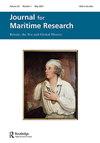‘And since that time has never been heard of…’ The forgotten boys of the sea: Marine Society merchant sea apprentices, 1772–1873
Q3 Arts and Humanities
引用次数: 0
Abstract
ABSTRACT The supply of child labour during Britain’s industrial revolution conjures mental imagery of destitute children toiling in mines and mills, but in recent years, historians have demonstrated that children worked in many nooks and crannies of the economy, not just the highly visible new industries. The shipping industry was a vital component of Britain’s commercial success in this period, yet the supply of boys has not received the same scrutiny as the children placed in the cotton industry. The Marine Society is best known for its pivotal role supplying the Royal Navy during manpower crises in the eighteenth century; this research highlights a lesser known aspect of its work, the recruitment of poor boys as apprentices to merchant ships. Using the Society’s apprenticeship registers, information has been gathered on 25,000 boys. Quantitative analysis is brought to life by contemporary newspaper reports and the Society’s treasure trove of correspondence, in order to develop not only a missing piece of maritime history, but also consider themes with wider significance to social and economic history. Individual tales of tragedy and triumph reveal what life was truly like for the boys who rode the crest of the wave, offering an empathetic element to the research.“被遗忘的海上男孩:航海协会商船学徒,1772-1873。
在英国工业革命期间,童工的供应让人想起在矿山和工厂里辛苦劳作的贫困儿童,但近年来,历史学家证明,儿童在经济的许多角落和缝隙中工作,而不仅仅是在引人注目的新兴行业。航运业是这一时期英国商业成功的重要组成部分,然而男孩的供应并没有像棉花行业的孩子那样受到严格的审查。海洋协会最为人所知的是,它在18世纪人力危机期间为皇家海军提供了关键作用;这项研究突出了其工作中鲜为人知的一个方面,即招募贫穷男孩到商船上当学徒。利用协会的学徒登记册,收集了25000名男孩的信息。定量分析是由当代报纸报道和协会的珍贵信件带来的,不仅是为了发展海洋历史的缺失部分,而且还考虑了对社会和经济史具有更广泛意义的主题。个人的悲剧和胜利的故事揭示了那些登上浪尖的男孩们的真实生活,为研究提供了同理心的元素。
本文章由计算机程序翻译,如有差异,请以英文原文为准。
求助全文
约1分钟内获得全文
求助全文
来源期刊

Journal for Maritime Research
Arts and Humanities-History
自引率
0.00%
发文量
0
期刊介绍:
The Journal for Maritime Research ( JMR ), established by the National Maritime Museum in 1999, focuses on historical enquiry at the intersections of maritime, British and global history. It champions a wide spectrum of innovative research on the maritime past. While the Journal has a particular focus on the British experience, it positions this within broad oceanic and international contexts, encouraging comparative perspectives and interdisciplinary approaches. The journal publishes research essays and reviews around 15-20 new books each year across a broad spectrum of maritime history. All research articles published in this journal undergo rigorous peer review, involving initial editor screening and independent assessment, normally by two anonymous referees.
 求助内容:
求助内容: 应助结果提醒方式:
应助结果提醒方式:


